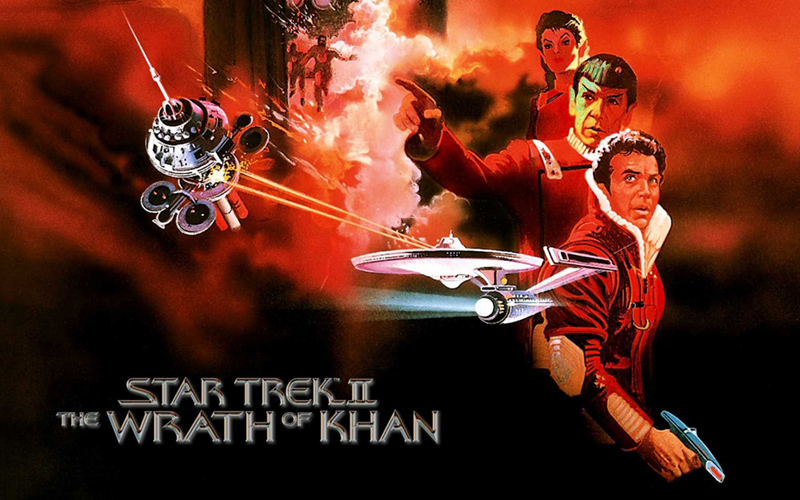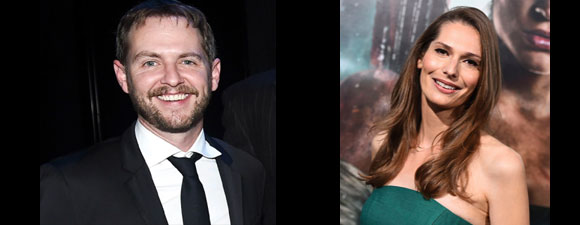Retro Review: Star Trek V: The Final Frontier
7 min readSpock’s long-lost half-brother lures the Enterprise as well as diplomats from the Federation, the Klingons, and the Romulans to the mysterious force at the center of the galaxy claiming to be God.
Plot Summary: Most of the NCC-1701A crew is enjoying shore leave when Starfleet orders the unready ship to the Neutral Zone. Nimbus III, the Planet of Galactic Peace, has been attacked, and representatives from the three major powers in the quadrant have been taken hostage. An impulsive young Klingon Captain, Klaa, intercepts the transmission and sets off to Nimbus III as well, hoping to capture Kirk and win glory among the Klingons. Kirk and his crew are able to track down the Federation representative St. John Talbot, the Klingon Korrd, and the Romulan Caithlin Dar, but to his shock, they have sworn loyalty to their abductor, a Vulcan named Sybok who has rejected the reforms of Surak and believes that emotion is the key to all knowledge. Sybok believes that he knows the location of paradise – which he calls Sha Ka Ree, though Talbot calls it Eden and Dar calls it Vorta Vor – and needs a starship to reach it. Spock has an opportunity to shoot Sybok when his followers force their way onto the Enterprise, but Spock refuses to do so, admitting to Kirk that Sybok is his half-brother, the son of Sarek and a Vulcan priestess. Sybok reveals that he can use his telepathic abilities to help his followers access and overcome their innermost pain, letting McCoy forgive himself for the death of the doctor’s father and showing Spock how the half-Vulcan has always regretted his father’s rejection of his human side. But Kirk refuses to share his pain, claiming that it defines him, and Spock and McCoy choose to remain with Kirk rather than follow Sybok. The ship survives the dangerous trip through the barrier at the center of the galaxy to find a small planet within. Kirk, Spock, and McCoy accompany Sybok to the surface, where Sybok calls out to God and summons a massive alien entity. Kirk is surprised that “God” needs a starship to escape from the planet, which infuriates the entity, who attacks them. Devastated, Sybok offers to help “God” confront his pain, and the two struggle, with a weakened entity the apparent victor. Scotty is able to beam Spock and McCoy aboard the hobbled Enterprise, but Kirk believes he will die alone on the planet. Then Klaa’s ship arrives and a chastened Korrd orders the younger Klingon to rescue Kirk. The Enterprise returns safely through the galactic barrier, and the Klingons and Starfleet officers celebrate an uneasy truce before Kirk returns home with his friends to finish their shore leave.
Analysis: I’m going to put the same disclaimer on this review that I put on my review of Star Trek: The Motion Picture. I am quite aware that Star Trek V: The Final Frontier is a terrible film even by the standards of third season original series Star Trek. That said, I adore it. It contains my single favorite line in the entire franchise – “Please, Captain, not in front of the Klingons.” People love Star Trek for different reasons: for some, the hopeful future is the most important thing, while for some it’s the exploration of science fiction ideas, and for others it’s the action/adventure. For me, it’s always been about the dynamics between the characters, so imagine my delight to learn that William Shatner – who directed and co-wrote this movie – sees Kirk, Spock, and McCoy, and the relationship between them, so close to the way I do. Shatner gets picked on quite a lot even by rabid fans, so think, for a moment, about all the things he doesn’t do in this film, or at least that Kirk doesn’t do. He doesn’t kill God; Sybok does far more damage. He doesn’t get the film’s best line; Spock does. He doesn’t get the film’s funniest line, either; that’s McCoy’s, “Jim, you don’t go around asking the Almighty for his I.D.!” He doesn’t even get the girl, since Uhura has inexplicably developed a passion for Scotty. He’s sad and helpless without his friends there. I know that various Trek actors have complained that Shatner stole all their big moments, but when given the opportunity to helm the franchise, Shatner produces a story about how Kirk can’t do a thing without his buddies and would be dead at the foot of a mountain if it weren’t for Spock.
Ah, Spock. It’s true that the version I loved for decades would never have participated in that “Row, Row, Row Your Boat” singalong, but as Dr. McCoy is so fond of pointing out, this is the Spock who had his eyes opened by V’ger and returned from the dead. I know that Sybok is often considered outside of canon or at the very best only marginally canon – I think, ironically, that Enterprise did more to solidify Sybok’s status than any sequel series with the introduction of the V’tosh ka’tur movement, though Sybok’s emphasis seems to be more spiritual than emotional – but Sybok’s existence goes a long way toward explaining not only Sarek’s complete inability to accept a son with emotions after he married a human woman with emotions, not to mention Spock’s own struggle with the feelings that have always been a part of himself. I find it hard to believe that seeing his own birth really represents his deepest pain; moments afterward, he’s back at Kirk’s side telling Sybok that Sybok doesn’t really understand him at all. I’m terribly fond of the scenes after Spock refuses to kill Sybok when Spock is beating himself up, when Kirk suggests that he should punch him and Spock doesn’t even argue logic. Of course it stretches credulity to claim that Spock and Sybok grew up as brothers – I refuse to believe that Spock would have failed to tell Kirk such a significant detail from his childhood – and Kirk seems to have forgotten that he lost a real brother as well as the Vulcan one he got back. And I won’t get started on questions like how Sybok got in touch with “God” at the center of the galaxy through the barrier, let alone why Sybok wanted to. Even putting canon aside, there are some fairly large plot holes and gaps in story that could drive the most ardent Trek fan mad.
Is it worth discussing the religious and philosophical issues at the heart of the film? As a general rule, Star Trek’s approach to religion has been unsatisfying; all higher powers are either charlatans, villains, or delusions, which both Kirk and Picard easily put off (Deep Space Nine‘s rich and complex Bajoran spirituality is an exception, though even some of the episodes with the Prophets – like the one where Sisko had to decide whether to risk Kira’s and Jake’s lives in a struggle with a Pah-wraith – turned manipulative and superficial). Sybok makes an interesting messiah in that he isn’t a phony, nor is he entirely delusional, and his power is focused on what he believes is helping others, though he sounds like a hypocrite when he decries the use of violence after having taken hostages to lure a starship to Nimbus III. (THIS is the best the Romulans, Klingons, and Federation could come up with as a planet of intergalactic peace?) The scene in which McCoy relives his father’s death is quite powerful, yet Kirk upstages that moment by refusing to give up the pain that has forged his character. The major characters repeatedly insist on refusing easy answers to difficult questions. It’s interesting that Sybok and McCoy both reject a god not who requires a starship but who inflicts pain upon others. The cult mentality of Sybok’s followers seems inexplicable given his relatively brief interaction with each, since most people aren’t defined by a single unhappy memory; it’s disappointing to see Uhura, Chekov, and Sulu so vulnerable, though delightful to see Scotty so perfectly content struggling with the ship that any hidden pain of his never becomes an issue.
The cinematography isn’t particularly exceptional, though I enjoy both the grungy Klingon ship with its leather-clad young punk Klingons (providing plenty of comic relief) and the climbing sequences both in the magnificence of Yosemite and aboard the Enterprise (both involving Spock in anti-grav boot, and also providing comic relief, particularly the group hug as Kirk, Spock, and McCoy escape their crewmates to keep free from Sybok). So some of the humor isn’t intentional – I’m sure audiences aren’t supposed to burst out laughing at the cantina scene stolen from Star Wars, at the rocks exploding through the ground to herald the arrival of “God,” and at the embarrassment of the campfire singalong. On the other hand, I really adore Uhura pretending in the half-darkness to be an exotic dancing girl so the crew can try to rescue the hostages, and Spock replying to Sybok’s affectionate greeting with, “You are under arrest for 17 violations of the Neutral Zone treaty.” Truly, there’s not a lot that’s defensible in the story, but I am incapable of resisting any film that ends with Spock evading Kirk’s embrace not because Kirk looks like he’s about to kiss him but because the Klingons are watching, followed by Kirk declaring that he thinks God resides in the human heart, and wrapping up with Spock playing “Row, Row, Row Your Boat” on the Vulcan harp while he, Kirk, and McCoy sing that life is but a dream. Obviously, not everyone is going to agree, but if I must choose between this fantasy of the future and any of the newer, hipper, darker, edgier versions, I’ll take this one every time.






